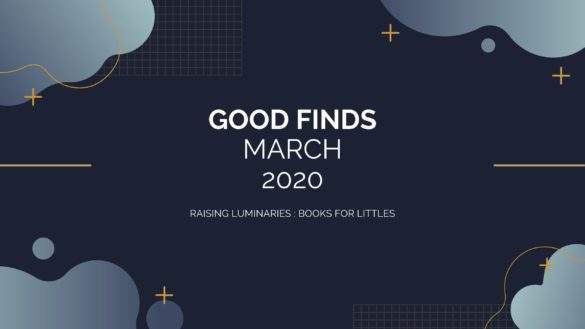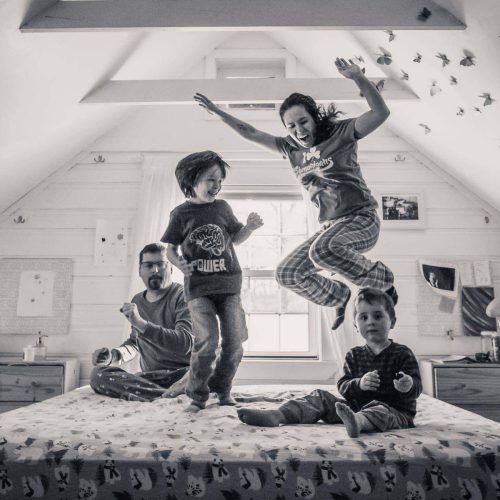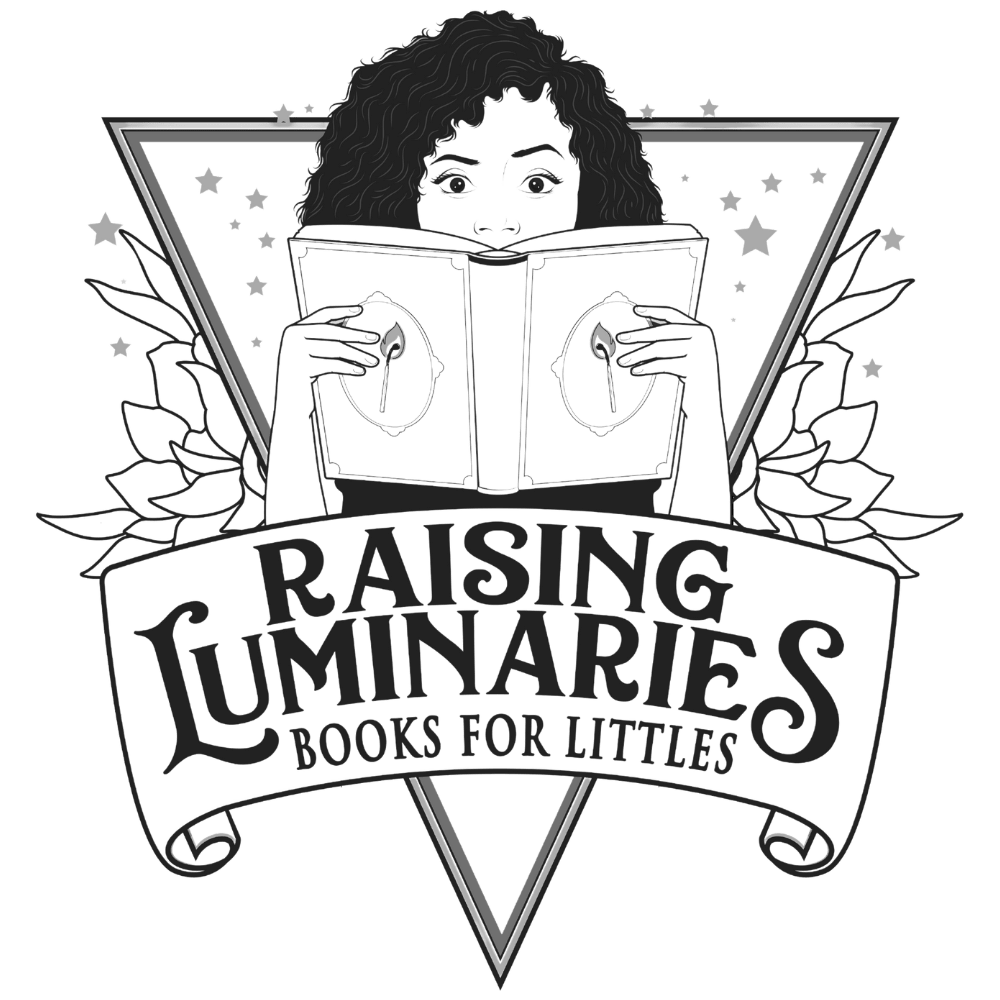[Image description: Good Finds March 2020 banner]
About This Month’s Good Finds
- Age-reference: unless otherwise specified, these books were a hit for Q (age 7.5), R2 (age 5.5)
- Affiliate links: This post contains affiliate links. Check out the full affiliate disclosure along with the BFL statement of accountability. When possible, I’m using Bookshop.org affiliate links, but since they’re still in beta, I’ll use Amazon affiliate links for stuff they don’t carry yet.
- If you run into glitches or bugs on Bookshop, contact info@bookshop.org (I can’t do anything about those). If you find glitches here – leave a comment below.
- For the full archives of our patreon-only good finds, you can find those here: All Good Finds Posts
Quick list:
This is a quick link list for folks who like to click through and add these to reading lists. See below for a review of each book.
- That’s Not How You Do It
- The Oldest Student
- Pilu of the Woods (disclosure: got a free copy from LFBC)
- His Royal Highness King Baby
- Pokko And The Drum
- The Legend of Rock, Paper, Scissors
- Tales for Picky Eaters
- Margot And The Moon Landing (disclosure, got a free copy from Annick press)
- My Footprints
I’m still having trouble finding some books on Bookshop.org. I know a lot of you click through and compile a quick wishlist using these links – is this annoying for you that this list links to two separate websites? Let me know in the comments.
Also, for older kids, teens & grown-ups:
- The Ghost Collector (disclosure: Annick sent me a free copy)
- The Dark Fantastic
Good Books:
Books we’ve been searching for
-
That’s Not How You Do It (hofmann-maniyar)
We’ve been searching for books that unpack mansplaining and being insufferably bossy. This was perfect, and even gave us an opportunity to discuss the concept of cultural conflict. It’s best for ages 5.5, and it’s a bit babyish for the 7.5yp (the one who needs it most), but the 7.5yo was willing to sit through it for a read or two and it helped him grasp the concept. While normally I avoid books that use racially coded Asian pandas doing a pan-asian mishmash (origami, chopsticks, pagoda block towers), for this purpose, it was fine because the rest of the book makes such a clear and powerful point. The maker is a white woman – which I feel is appropriate – in her bio she alludes to confronting her own white-centering in the past. -
The Oldest Student: how mary walker learned to read (hubbard)
This is definitely going into our anti-ageism for elders flexibility collection. Not only does it dismantle stereotypes about older adults being inflexible and unable to learn (pish posh!) but it also shows some of the obstacles facing people who were born enslaved, and the intersection of what how a woman caretaker’s education is de-prioritized under oppression. I’ll also be adding this to our Black women -
My Heart Will Not Sit Down(Rockliff)
This teeters on the edge of problematic if we don’t tread carefully. The last thing we need is one more book showing Africans as poor and destitute. HOWEVER – unlike other books, this story alludes to the reason for the poverty (colonization, specifically a head tax) and counters the concept of Africans as helpless victims & recievers of white benevolence. Based on a true story, this counters the white savior narrative by showing Africans sacrificing to support American children living in poverty. In the story, their ‘help’ is less than a drop in the bucket – so you will have to discuss this carefully – that ever penny counts, rather than ‘oh look at them isn’t that cute.’I’m going to trust you to wrestle with this properly. More than anything, this story gives kids a mirror to see the human condition of feeling compelled to do something when we know another person is suffering. With urgency, caring, empathy, and knowledge that makes sitting still impossible. Beyond that, this is a great intro book to discuss how colonization uses capitalism and currency as a tool to subjugate and control occupied countries. -
Pilu of the Woods (nguyen) – Willow reads as nonbinary to me, no pronouns ever mentioned, but Willow does use the girl’s bathroom. I’m slowly amassing a collection on the power of crying, and this will definitely be our headliner for that collection. About letting our feelings out instead of bottling them up, this would pair well with ‘The Heart and the Bottle’ well if you’re wrestling with grief and the death of a loved one. social emotional, death of mother, loneliness, regret, sibling conflict & healthy sibing relationships. touches on nature & environmentalism – they address how you have to be careful not to destroy things in nature and how we can leave unintended consequences. Wonderful for 7, but wouldn’t go much younger than 6. This was the first book my reluctant reader actually plowed through on his own. Graphic novel. Disclosure: Got for free from LFBC
Books that made us laugh
- His Royal Highness King Baby(lloyd-jones)
The 7yo enjoyed this more than the 5yo, but they both loved reading this multiple times. It’s definitely a keeper to revisit as sibling rivalry pops up. The incongruency between the words and pictures make the kids feel smart and help them recongize hypocracy, and jealousy within themselves. It’s hilarious – the 7yo laughs and laughs and the 5yo (who misses many of the jokes) joins in. The yo loves how she percieves herself as oppressed and victimized when what is really going on is her parents are giving her tons of things and doing all the work for her. Works SUPER well for our latest initiative to get kids to pick up more slack with household chores, and when they bring out the ‘He ALWAYS gets / I NEVER get…’ magical thinking, ignorance of privilege. perspective. -
Pokko And The Drum (Forsythe)
This was SO MUCH fun. Very simple book that gets more complex with subsequent reads. Reminds me of the witty humor and suspense of Barnett & Klassen’s Shape trilogy. The author juggles tension and drama and silliness so well for such a short and simple book. Kickass girl who literally marches to the beat of her own drum. Even though she’s inconvenient to have around and makes a ruckus, she ends up being a fantastic leader. Normalizes nontraditional gender roles (dad does domestic stuff and childcare, mom reads and studies). Minimal text makes this a good early reader (grade 1), and could be used as an allegory for the social model of disability & neurodiversity. great for music-lovers, particularly loud ones like Q. both enjoyed at 5 & 7, but 7 got more out of the humor. Bonus: feminist fathers - The Legend of Rock, Paper, Scissors (rex)
From the archives! Because we need more silly books that aren’t about oppression and pandemics! I was originally nervous aboutthe violence in this one, but at 6.5 Q was obsessed with rock, paper, scissors since everyone in first grade was playing it. Q LOVES this book, r2 enjoys it at 4.5. we are able to wrestle with the idea of violence in the fact that they are not real, and this is a magical world where the wrestling doesn’t hurt and they recover from damage (as seen in the images). But the action, and hilarious dialogue was just fun to read out loud and made me chuckle. Throughout the weeks during times when we weren’t reading it, Q had it churning around in his brain, he’d suddenly pipe up about a new insight he had about the story, or he’d finally figure out the joke. this was a book he was excited to read on his own, which says a lot given how reluctant he is as a reader. most of all they loved this new concept of WANTING to be beaten – how finding a worthy opponent and a good challenge to savor. The point isn’t about being ‘the best’ or defeating others. But the exercise in tacking a problem – that’s the magic of humanity! we discussed how we WANT challenges, and that’s what makes life fun, that’s what makes humans thrive and innovate. how a strong and healthy friendship means you can challenge each other with consent, not just be submissive or boss each other around. surprisingly deep conversations from what at first appeared to be a goofy one-time read. healthy competition, friendship. if I had my druthers, i’d read it for 6+. It’s worth noting that every single sparring event in this book (and that’s what it is – sparring, just like football or martial arts) is consensual.
Books that gave us hope
- Margot And The Moon Landing (fitzpatrick)
Oh my gosh this was SO GOOD. Validating frustration with communication issues, but really this Asian Indian girl codes HARD as autistic but they don’t label her or other her. Hyperfocus, communication disabilities, and frustration with social emotional issues that every kid can empathize with. I want to pause only becuase this isn’t #OwnVoices, so I wonder what the White author & Latina illustrator (Mexican Canadian) could potentially be missing. HOWEVER Annick usually does a solid job so I’m not too worried. SO GOOD, with layers – started us up on conversations of hyperfocus, looping, communication, would pair PERFECTLY with ’The Conversation Train.’ for autistic kids. We see how this conflict between her communication style and hyperfocus conflicts with the style of those around her. Able to read through it each time with a different lens. On making mistakes, and how her mom still loves her and is willing to meet her there in that low space, like a parent should, but also we discussed healthier ways to get our outlets out (like writing on paper, instead of the walls, a la Ada Twist Scientist). My Allistic kid got so much out of this too, on how it feels to keep all those feelings bottled up inside, and how much easier it is to let them out once vented, even if they’re vented imperfectly. How mom doesn’t tone police her method of communicating, but really listens to what’s going on. Amazing on so many levels. Disclosure: Annick Press sent me a free copy. -
My Footprints (Phi)
AAPI makers about a multiracial AAPI family! Validating for getting picked on at school. The text takes practice to get into – there isn’t really a hook, and the author leaves a lot unsaid. So this isn’t a one-and-done book, more of something that sits on the shelf for kids to ruminate on over the course of months. Normalizing LGBTQ+ family constellations, with lesbian moms. Thuy’s pronouns are she/her. illustrations are SO CUTE, and while the story feels like a simple thing about experiencing and treking through snow, it also gives kids an opening to start talking about things they are feeling upset about at school. briefly addresses how Thuy is picked on at school for having two moms (homophobia), being told to go back where she came from (xenophobia), and just bugging her for being a girl (sexism). Thuy wishes she could be a huge monster or another animal to make her bullies stop. Phi is an Vietnamese refugee and cis man, and his author’s note at the end about his responsibility to own his privilege and past mistakes is amazing. - Tales for Picky Eaters
Normally I wouldn’t even mention this book as fillter, but Q got this short chapter book out of the school library and R2 has asked to read it every night for a month now. It’s silly, the humor is goofy, and the dad tells tall tales (or whatever allistic people call it – in our family this is called straight-up LYING). It’s just a nice release for him to get into the fantasy of basement trolls who cook lasagna and eating gross things. Mostly my kids are just super proud adventurous eaters so this helps them feel superior – so I don’t know how it would go over for other kids. There are no redeeming morals, the parenting is questionable, the protagonist is a little insufferable, but the story is fun escapism.
Bonus: What I’m reading this month:
- The Ghost Collector(Mills) – Loved this, GOSH! SO GOOD about making mistakes, irrevocable ones! About closure being something you can’t get from other people. About grief and how it isn’t really something you can or should try to control or overcome. #OwnVoices Indigenous author (Ililiw/Cree & Settler). Ages 7+ Death of a parent (mother), family constellations (intergenerational, later single-grandparent – grandmother, mother, daughter) ties in indigenous heritage & faith. a little spooky but not so much it will give kids nightmares. I got free copy from Annick Press, they spoil me rotten.
- The Dark Fantastic
We’ve got an ongoing discussion about this in the Luminary Brain Trust. It was a bit of a chore to get through, with some good parts, some academic prose. I’m pretty sure the whole premise and examples could have been summed up in a 5-part blog post, but that cover – gorgeous, right? The one thing I got out of this is a little more confidence in understanding the Afrofuturism & the Black Futures movement – which is still so new, and still something I don’t want to co-opt, that I feel a little more confident being able to at least identify books that do more good than harm. - They Called Us Enemy (takei)
#Ownvoices AAPI (Japanese) author, internment camps. Okay first let me say that there is a correllation between celebrities who write childrens books and how shitty these books turn out, but Takei rocked this so hard. Does he ever do anything poorly? Damn! Can’t match this.
This was an excellent graphic novel, but writing was too advanced for 7, particularly with the politics and name-dropping. Addresses xenophobia, racism, trauma. SO GOOD. immigration, racism, white accomplices (attourney wayne collins, gene roddenberry)




